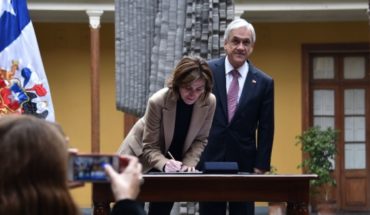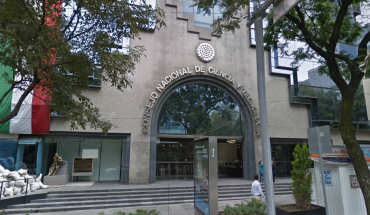The federal government used 322,000 scholarship holders from the Youth Building the Future program to correct in 2019 the lack of personnel in agencies such as the Secretariat of Welfare, Agriculture, Civil Protection or the National Institute for Adults, after the austerity policy of President Andrés Manuel López Obrador forced them to stop hiring personnel.
But in contrast to the usual hires, the young people only received as payment the scholarship of 3,600 pesos per month, and the government saved contracts, benefits and seniority.
The young people who worked in government in 2019 represented 28% of the total number of scholarship holders in that first year of operation of the program, whose objective is to link young people who do not study or work with companies so that they acquire experience, and then can self-employ or get a job.
You may be interested: Scholarships for the deceased and work centers that do not exist: the irregularities of Young People Building the Future
This percentage also shows that the government violated the guidelines of its own program, which establish a maximum number of fellows per location, but only in the Coordination of Integral Development Programs – created in this administration, without budget to hire staff and within the Office of the Presidency – there were 41,815 fellows. While 26 thousand 939 more young people were sent to delegations of the Secretariat of Welfare in the states to join the Servants of the Nation.
Both instances concentrate the largest number of scholarship holders among all government agencies and also exceed all companies, since the ones that had the most scholarship holders were the Association of Banks of Mexico and Bimbo, with 2,883 and 791 scholarship holders, respectively.
Only in the delegation of Welfare in Veracruz there were more than 6 thousand scholarship holders; in Chiapas more than 3 thousand; in Oaxaca, Guerrero, Coahuila and Puebla more than 2 thousand, and hundreds more in each of the country’s delegations to carry out the same tasks as the Servants of the Nation, as confirmed by testimonies and officials.
This also violated the collaboration agreement that each institution had to sign with the Ministry of Labor to participate in the program. According to the document (annexed in the 2019 guidelines), the institution could determine the number of scholarship holders to be incorporated, “provided that it does not exceed its operational capacity or more than double the number of workers it has.”
The Ministry of Welfare, for example, has hired 19,607 Servants of the Nation, and incorporated more than 68,693,000 scholarship holders, more than triple the payroll of this type of officials.
With these guidelines published in January and June 2019, the Ministry of Labor intended to ensure that the tutors actually taught something to the fellows and not that they were used to replace employees, but the government itself failed to comply with it.
Even the Superior Audit of the Federation had already warned the Ministry of Labor that having this number of scholarship holders in government “contrasted” its own guidelines, as stated in the forensic compliance audit number 374-DE, carried out as part of the first report of Public Account 2019.
Animal Político sought the Ministry of Labor and the Secretariat of Welfare to know their position on the matter, but there was no response.
Government work, scholarship payment
The General Coordination of Integral Development Programs was an area of government created in this administration to operate social programs and, despite being in charge of a priority, it was born without an administrative structure and without a budget for the creation of places.
The Organic Law of the Public Administration indicates that this Coordination depends on the Office of the Presidency and is only composed of one chief: the general coordinator of Integral Development Programs, a position occupied until last June by Gabriel García Hernández, former director of acquisitions in the Head of Government of López Obrador, financial operator of the Morena trusts and coordinator of the defense of the vote in the 2018 elections.
The Coordination of Programs, in the absence of administrative structure, operated through the Coordination of Delegations of the Secretariat of Welfare.
This Coordination in Welfare was left as administrative responsible for the Servants of the Nation, area directors, a support structure and the federal delegates, responsible for operating the programs in the states; although the latter are appointed by the General Programme Coordinator of the Office of the Presidency.
And to implement the programmes on the ground, the Integrative Development Centres were opened throughout the country. These are offices installed in government buildings or even in spaces lent by the same communities, explains Manuel Huerta, the delegate in Veracruz.
However, regardless of the scheme, they require personnel to attend to them, in this case Servants of the Nation, who also have other tasks such as looking for beneficiaries of social programs from house to house, verifying work centers of the Youth Building the Future program and even helping in the brigades of application of vaccines against COVID-19.
According to Transparent Payroll, there are 19,607 Servants of the Nation throughout the country who earn 10,000 pesos per month and 13,164 Integrative Development Centers.
The 68,000 Youth Building the Future fellows assigned to the Secretariat of Welfare and Program Coordination is, in fact, 3.5 times greater than the number of Servants of the Nation hired.
But while the payroll of 19,000 servers costs 196 million pesos a month, paying 3,600 pesos to the 68,000 scholarship holders who do the same work means 244 million pesos a month, although delivered through scholarships and not salaries.
If this number of young people were hired as Servant of the Nation, the payroll would amount to 686 million 930 thousand pesos per month, but being scholarship holders, the government stops paying 442 million pesos, plus the payment of benefits and seniority.
In the delegation of the Veracruz Welfare Secretariat, for example, there were 6,646 scholarship holders, the largest number among the state representations, and also has the largest number of Integrative Development Centers (1,602) throughout the country.
Manuel Huerta Ladrón de Guevara, Federal Delegate in Veracruz, explains in an interview with Animal Político that young people are “trained in attention to the public and work with the communities, which is what the Servants of the Nation do.”
These are young people from the same communities who “find in the scholarship a way to train and earn an income,” he says. To the question of who ordered the fellows to be integrated into these tasks, Huerta responds that these are “central government agreements that we (in the delegations) only implement.”
Huerta assures that there are possibilities of hiring for the scholarship holders, since it works as a “system of gradual incorporation” to be a servant of the nation or an official in some other governmental structure such as the Welfare Bank. “Everyone feels very satisfied with the experience of serving in their community,” he says.
This is how they registered fellows as Servants of the Nation
Mariana, 22, was a Youth Building the Future fellow since 2019 in the General Coordination of Integral Development Programs. First he accompanied the Servants of the Nation to go house to house as an auxiliary, to look for beneficiaries in localities of Hidalgo.
A year later, his scholarship was renewed to take charge of one of the 13,000 Integrative Development Centers that did not have public officials hired. Mariana and two other fellows were in charge of “attending people, registering them for the programs, giving them information and doing procedures, from Monday to Friday, from 10 in the morning to 4 in the afternoon,” she explains.
At this time he learned to treat people, but he does not intend to work on this in the future. Her true aspiration is to have an aesthetic, that’s why she occupied part of the 3,600 pesos per month of her monthly scholarship to pay for beauty courses and buy material and devices for her future business.
It is evident the emotion with which Mariana relates how much she likes to cut her hair or put false nails like the ones she uses, unlike the serious countenance when she described her work in government, but then, why did she choose an aesthetic to be an apprentice if the program just tries to link young people to the places of their interest?
The reason is that during the survey of the Servants of the Nation, one of them explained that she could be a beneficiary of the program and also offered to help her register through the internet platform. But he did not show him the list of possible work centers for his election, but suggested that he choose the government option of “Coordination of programs” to be “auxiliary of Servant of the Nation”.
Consuelo, who worked as a Servant of the Nation in that community, assures that this was an order. “The coordinators told us ‘look for young people, invite young people because there is a lot of workload’. That is why the Servants of the Nation located who might be susceptible to being scholarship holders and then made sure to register them as their auxiliaries.
Dinora, another former servant of the nation, explains that each server was in charge of one or two Integrating Centers, but “we were very few servers and the people were many,” that’s why “more interns were channeled there, so that nothing mores were auxiliaries, but attended the centers”.
Read more: Young People Building the Future: No One Verifies That Fellows Are Trained, Says Coneval
Budget cut, interns increase
Among the institutions that had the most interns during 2019, there were also cuts in the “personal services” segment, that is, employee positions.
For example, the National Council for Educational Development (CONAFE) dedicated to bringing education to the most marginalized villages in the country through multigrade courses, had a 16% cut in the field of personal services during 2019: it went from 12 million 193 thousand pesos to pay salaries in 2018 to 10 million 189 thousand pesos in 2019, according to the Public Account.
However, that year it had 21,458 scholarship holders from the Youth Building the Future program who carried out tasks such as “participation in training events of the educational model of CONAFE and performance of teaching activities, attending to the children and adolescents that CONAFE attends in basic education services,” according to the SEP in an informative note.
These are the same tasks that do the “leaders for community education”, who earn 3,748 pesos per month for a school year, but at the end of it, they get the payment of one thousand 240 pesos for 30 months as a stimulus to continue studying.
The National Institute for Adult Education (INEA) had a 26% cut in its total 2019 budget and 1% in salaries. In 2019 there were 4,887 Youth Fellows who “attended 17,728 learners, who presented 11,317 module exams, accrediting 73%,” reported the SEP.
This work is carried out by educational advisers, people trained by the INEA for adult education, but who are not hired and their salary depends on productivity, that is, on the number of people who pass the exams per module or accreditation of educational level.
In Civil Protection there were 10,797 scholarship holders, who served to form civil protection teams in municipalities, because in most of them it was not possible to have them because they do not have a state budget to hire personnel or buy equipment against contingencies, said a former official in the area who asked not to publish his name.
At the Mexican Youth Institute, the 4,329 fellows served to bring their own strategies to more regions. For example, Imjuve volunteers gave workshops to the young fellows, and then they replicated the courses to other young people during the year they maintained the scholarship, as explained by the director of the institution, Guillermo Santiago, in an interview.
While the 19,000 fellows assigned to the Ministry of Agriculture served as accompaniment to the beneficiary producers of the Production for Welfare program throughout the country.
The fellows received online training through programs designed exclusively for them, and in person by the productive technicians, so that they could then assist the producers. With this, they seek that “young people get involved in the field, creating good synergy,” said Natividad Díaz, a member of the team of the Agency’s Technical Accompaniment Strategy.
What we do at Animal Político requires professional journalists, teamwork, dialogue with readers and something very important: independence. You can help us keep going. Be part of the team.
Subscribe to Animal Político, receive benefits and support free journalism.#YoSoyAnimal





